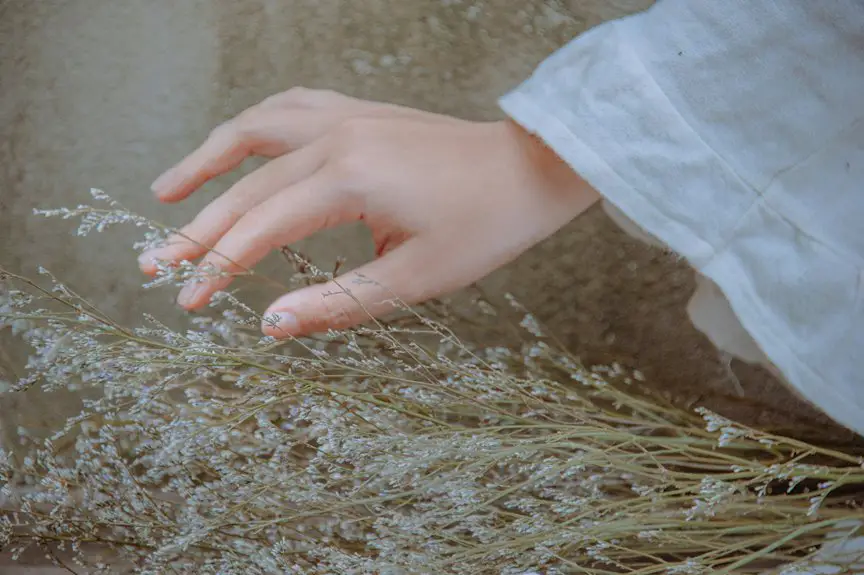When it comes to choosing the right fabric, you might wonder if Lyocell is a suitable option for both your sensitive skin and the planet. This material offers unique properties that could enhance your comfort while also promoting sustainability. But are these benefits enough to make it the go-to choice? Let’s explore what makes Lyocell stand out and whether it truly lives up to its reputation.
Table of Contents
Key Takeaways
- Lyocell fabric is soft and breathable, making it comfortable for sensitive skin while minimizing irritation and friction.
- It has antibacterial properties, reducing the risk of skin irritation and infections for sensitive skin.
- The moisture-wicking abilities of Lyocell regulate temperature and keep skin dry, promoting all-day comfort.
- Environmentally, Lyocell is produced through a closed-loop system that minimizes waste and uses less water and energy.
- As a biodegradable fabric, Lyocell positively impacts the environment by reducing landfill waste compared to synthetic materials.
Understanding Lyocell Fabric
Lyocell fabric, often celebrated for its eco-friendly properties, is a popular choice for those with sensitive skin.
Derived from sustainably sourced wood pulp, this fabric undergoes a closed-loop process that minimizes waste and chemical use. You’ll appreciate how soft and breathable it feels against your skin, making it an excellent alternative to harsher materials.
Sourced from wood pulp, Lyocell is soft, breathable, and eco-friendly, making it a gentle alternative to harsher fabrics.
Its moisture-wicking abilities help regulate temperature, keeping you comfortable throughout the day. Plus, Lyocell is biodegradable, ensuring that your choices have a positive impact on the environment.
When you wear clothing made from Lyocell, you’re not just prioritizing your comfort; you’re also supporting sustainable practices. Understanding its unique properties can help you make informed decisions for both your skin and the planet.
The Benefits of Lyocell for Sensitive Skin
If you have sensitive skin, you’ll appreciate the benefits of lyocell fabric.
Its antibacterial properties help keep your skin clean, while moisture management guarantees you stay comfortable throughout the day.
Plus, the soft texture feels gentle against your skin, making it an ideal choice for those prone to irritation.
Antibacterial Properties
Because of its unique structure, Lyocell fabric offers excellent antibacterial properties that make it an ideal choice for those with sensitive skin.
This fabric naturally inhibits the growth of bacteria, which helps reduce the risk of irritation and infection. When you wear Lyocell, you’re less likely to experience breakouts or rashes, as its fibers create a less favorable environment for harmful organisms.
Additionally, this antibacterial action can keep your clothing fresher for longer, meaning you won’t have to wash them as frequently. This benefit not only helps your skin feel comfortable but also extends the life of your garments.
Moisture Management
When it comes to sensitive skin, effective moisture management is vital for comfort and health.
Lyocell fabric excels in this area, making it an ideal choice for those with delicate skin.
Here are some benefits of Lyocell’s moisture management:
- High Absorbency: It can absorb moisture up to 50% more than cotton, keeping your skin dry.
- Breathability: The fabric allows air circulation, preventing overheating and discomfort.
- Natural Moisture Regulation: Lyocell helps regulate humidity, maintaining an excellent balance for your skin.
- Quick-Drying: Its quick-drying properties guarantee you stay comfortable throughout the day.
Soft Texture
Along with superior moisture management, the soft texture of Lyocell fabric greatly enhances comfort for those with sensitive skin.
You’ll appreciate how gentle it feels against your skin, reducing irritation and friction. Unlike rougher fabrics, Lyocell is smooth and silky, making it an ideal choice for anyone prone to rashes or discomfort.
This softness allows you to wear it all day without feeling restricted or uncomfortable. Plus, its breathability means you won’t overheat, adding to your overall comfort.
You’ll find that Lyocell drapes beautifully, creating a flattering fit that feels as good as it looks.
With Lyocell, you’re not just choosing a fabric; you’re opting for a soothing experience that prioritizes your skin’s health.
Moisture Management and Breathability
Lyocell fabric stands out for its exceptional moisture management and breathability, making it an ideal choice for those with sensitive skin.
This fabric helps you stay comfortable by efficiently wicking away moisture, preventing irritation. You’ll appreciate its lightweight feel, which allows air to circulate, keeping you cool and dry throughout the day.
Here are four key benefits of Lyocell’s moisture management and breathability:
- Moisture-wicking: Absorbs sweat and moves it away from your skin.
- Air circulation: Promotes airflow, reducing overheating.
- Quick-drying: Dries faster than many other fabrics, preventing dampness.
- Odor resistance: Natural properties help minimize unpleasant smells.
Choosing Lyocell means prioritizing comfort without compromising your skin’s health.
Environmental Impact of Lyocell Production
Choosing Lyocell not only benefits your skin but also supports sustainable practices. When you opt for Lyocell, you’re backing a production process that uses less water and energy compared to traditional fabrics.
The closed-loop system in its manufacturing recycles water and solvents, drastically reducing waste. This means you’re contributing to a more eco-friendly textile industry.
Additionally, the raw materials come from sustainably sourced wood pulp, often from certified forests, ensuring that no harmful practices are involved in harvesting.
Biodegradability and Sustainability
When it comes to sustainability, Lyocell stands out because it’s not only biodegradable but also designed to minimize environmental impact. Choosing Lyocell means you’re making a responsible decision for both your skin and the planet.
Here are some key benefits:
- Biodegradable: Decomposes naturally, reducing landfill waste.
- Sustainable sourcing: Made from sustainably harvested wood pulp, often from eucalyptus trees.
- Closed-loop production: The manufacturing process recycles water and solvents, minimizing pollution.
- Low water usage: Requires less water compared to traditional cotton, conserving essential resources.
Comparison With Other Fabrics
While many fabrics claim to be suitable for sensitive skin, Lyocell often outshines them due to its unique properties.
Unlike synthetic materials, which can irritate your skin, Lyocell is made from natural fibers and undergoes a closed-loop production process, minimizing harmful chemicals.
Cotton, while breathable, can harbor allergens and require pesticides during growth, making it less ideal for sensitive skin.
On the other hand, silk feels luxurious but may lead to skin reactions in some individuals.
Even bamboo fabric, though often marketed as hypoallergenic, can involve harsh processing chemicals.
Versatile Applications of Lyocell
Lyocell’s versatility makes it an excellent choice for a variety of applications, from clothing to home textiles.
Lyocell’s adaptability makes it a top choice for diverse uses, ranging from fashion to home essentials.
If you’re considering incorporating Lyocell into your life, you’ll find it serves multiple purposes:
- Apparel: Its soft texture and breathability make it perfect for shirts, dresses, and activewear.
- Bedding: Lyocell’s moisture-wicking properties keep you cool and dry, enhancing your sleep experience.
- Towels: Soft and absorbent, Lyocell towels dry quickly and feel gentle on the skin.
- Underwear: Its hypoallergenic nature makes it ideal for sensitive skin, providing comfort and protection.
With these applications, Lyocell not only meets your needs but also aligns with eco-friendly choices, proving to be a smart investment for both you and the planet.
Challenges in Lyocell Production
Though Lyocell offers numerous benefits, its production process presents several challenges that can impact sustainability and cost.
One significant issue is the sourcing of wood pulp, which often involves deforestation and habitat destruction. You may find that not all manufacturers prioritize sustainable forestry practices, leading to environmental concerns.
Additionally, the solvent used in the production process, while non-toxic, must be managed carefully to prevent pollution. This requires strict adherence to safety regulations, which can complicate production.
Furthermore, the energy consumption during manufacturing can be high, raising concerns about its overall environmental footprint.
Ensuring a balanced approach to these challenges is essential for making Lyocell a truly sustainable fabric option that aligns with eco-friendly values.
Cost Considerations and Market Demand
As demand for eco-friendly fabrics rises, understanding the cost considerations of Lyocell becomes essential for both consumers and manufacturers.
While Lyocell offers numerous benefits, its production is generally more expensive than conventional fabrics.
Lyocell, while beneficial, tends to be pricier to produce compared to traditional fabrics.
Here are key factors influencing its cost and market demand:
- Raw Material Sourcing: The sustainable wood pulp used in Lyocell can be pricier than traditional fibers.
- Production Process: The closed-loop process, while eco-friendly, requires advanced technology, increasing manufacturing costs.
- Market Trends: Growing consumer awareness of sustainability boosts demand, often allowing manufacturers to set higher prices.
- Branding: Companies emphasizing eco-friendliness can command premium prices, reflecting their commitment to sustainability.
The Future of Lyocell in Fashion and Textiles
While many fabrics struggle to meet the growing demand for sustainability, Lyocell is poised to lead the charge in the fashion and textiles industry.
With its eco-friendly production process and biodegradable properties, Lyocell appeals to both conscious consumers and brands looking to enhance their sustainability credentials.
You’ll find that the versatility of Lyocell allows for a wide range of applications—from clothing to home textiles—making it a favorite among designers.
As more people become aware of environmental issues, the demand for ethical fabrics like Lyocell will only increase.
Frequently Asked Questions
Is Lyocell Suitable for Individuals With Allergies?
If you have allergies, Lyocell’s hypoallergenic properties make it a suitable choice. Its smooth texture reduces irritation, and it’s less likely to harbor dust mites or allergens, providing a comfortable experience for sensitive individuals like you.
How Does Lyocell Feel Against the Skin?
Did you know 80% of people prefer soft fabrics? When you wear lyocell, it feels incredibly smooth against your skin, providing a luxurious touch that enhances comfort and makes you feel relaxed throughout the day.
Can Lyocell Fabric Shrink When Washed?
Yes, Lyocell fabric can shrink when washed, especially if exposed to high heat. To prevent this, you should wash it in cold water and air dry, ensuring your garments maintain their original size and shape.
What Colors Are Available for Lyocell Products?
When you plunge into the vibrant sea of lyocell products, you’ll discover a spectrum ranging from earthy tones to vivid hues. You’ve got options like soft pastels, deep jewel tones, and everything in between.
How Should Lyocell Fabric Be Cared For?
Caring for lyocell fabric’s easy! You should machine wash it on a gentle cycle in cold water, use a mild detergent, and avoid bleach. Hang it to dry or tumble dry on low for best results.
- What Is Pochampally Ikat? a Journey to India’s Silk City - June 27, 2025
- What Is Pochampally Ikat? a Journey to India’s Silk City - June 27, 2025
- What Is Pochampally Ikat? a Journey to India’s Silk City - June 27, 2025






